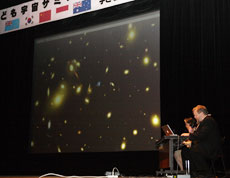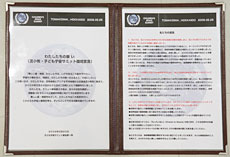Q. From your point of view, are there any differences of opinion between Japanese children and children from abroad on environmental issues?

Participants in the Children's Space Summit
(Courtesy of Young Astronauts Club - Japan)
There was an opportunity for children from overseas to present the situations in their home countries away from the group discussions. The content of these presentations was excellent. I think the children from overseas were very well trained for the presentations in comparison to Japanese children.
Children from overseas also made presentations about their daily lives. For example, an Australian child had actually experienced coral bleaching and droughts caused by global warming, and described first-hand what that was like. Another child, from Tuvalu, explained how it felt to live in a country that may end up submerged under water due to rising sea levels.
Japanese children had only known about these environmental problems through TV or the Internet, so I think it had a huge impact on them to hear about them in the form of the actual experiences of their peers. Japanese children understand, as things they have learned at school, that saving resources and energy are necessary. However, I think that listening to real-life peers might have made our Japanese children realize that they have never considered how these actions were linked to actual environmental issues or how the issues will affect their own lives.
Q. What were the responses from the children who participated in this summit?

Dr. Jones's keynote speech
(Courtesy of Young Astronauts Club - Japan)
Dr. Jones from Tama University showed a futuristic set of computer graphics about how we human beings might look back on the Earth's current environment, once we reach an era when we regularly travel to space. The children watched this presentation, which offered an interesting viewpoint as a lesson from the future, with great interest.
Dr. Jones also facilitated a game where children had to draw a world map. Every child drew the place where they live at the center of the map. Japanese children drew the islands of Japan first, while Australian children drew Australia at the start. Through this single act, the children realized that in some cases our points of view are naturally somewhat biased and self-centered. It requires effort to process the fact that there are other communities on Earth with other goals and concerns, and it is important to know how people from these communities think about the world where they live. In this way, I felt this summit functioned very effectively.
Specifically, I think it was most important for the children to discuss these issues among themselves. When you listen to a lecture, the information is retained as knowledge, but by discussing things based upon a lecture and exchanging opinions with others, it becomes a more real experience. I think, by the end, each child who attended the conference experienced a great impact from what they learned.
Q. How do you think the experience gained from the Summit will be used for the children's future?

A child reporter attempting Internet broadcasting
(Courtesy of Young Astronauts Club - Japan)
What I felt the most was that having children from abroad participate made it a totally different experience for the Japanese children. The Summit took on a much more global viewpoint, with the children considering different viewpoints, issues, and realities from elsewhere. Some of the issues are somewhat common and can be dealt with similarly, but others are different. The children definitely had a sense of solidarity that impressed me, and through this experience, their viewpoints were broadened and I think they came to understand the issues on Earth as a common problem for everyone to solve together.
At the summit venue, children participating in the Young Astronauts Club of Japan got together as reporters. The Kids' Space News published the progress of the Children's Space Summit live on the Internet. This enhanced the cooperation between children. I think the adults who participated at the Summit were considerably stimulated by the children, also.
Q. What kind of developments will the Children's Space Summit cause in the future?

Suggestions adopted at the Children's Space Summit
(Courtesy of Young Astronauts Club - Japan)
The summit was held with the cooperation of the city of Tomakomai in Hokkaido, but next time I'd like to see other local governments get involved and gather children from around the world. Environmental problems are a worldwide concern, and over time it will only become more important for the children of the world to discuss these issues. The children that offered suggestions this time will become adults before long, so I recommend holding the Children's Space Summit on a regular basis. This will bring a sense of continuously passing the baton from generation to generation, and we will always consider the current children's viewpoint.